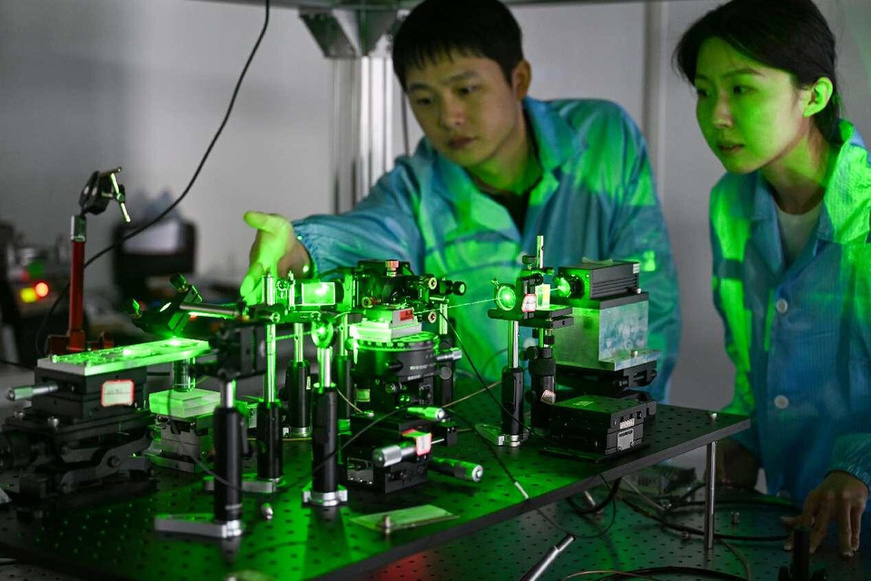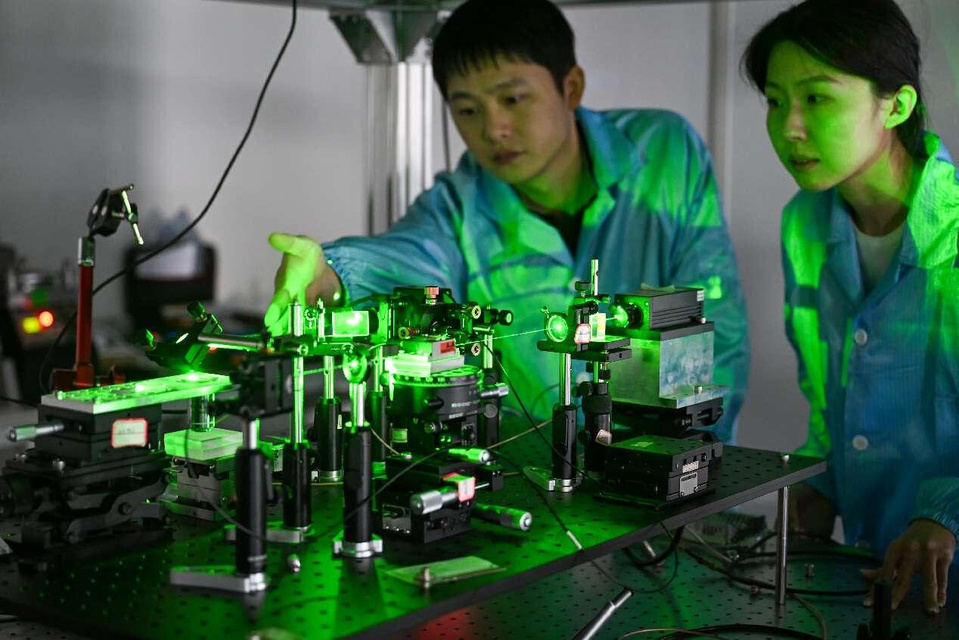By Han Junjie, People's Daily

In a laboratory of QuantumCTek Co., Ltd. in Hefei, east China's Anhui province, researchers are calibrating a quantum diamond probe scanner. (Photo by Huang Yangyang/People's Daily Online)
Along Yunfei Road in the Hefei National High-Tech Industry Development Zone, east China's Anhui province, prominent "quantum" signs appear at regular intervals. The road is known as "Quantum Street" to many locals.
On both sides of the road, there are more than 30 leading quantum technology enterprises, covering quantum computing, quantum communication, and quantum measurement - forming the most concentrated quantum industry cluster in China.
Among the trailblazers is QuantumCTek Co., Ltd., whose exhibition hall offers a window into the development of quantum technology. A massive screen displays live footage of the "Beijing-Shanghai Backbone" project, a quantum-secured communication backbone line connecting Beijing and Shanghai.
"Traditional digital encryption risks being compromised in the face of massive computational power," explained Peng Chengzhi, chief scientist of QuantumCTek. "Quantum key distribution, however, offers a robust defense against such threats, securing data even as computing capabilities advance."
Founded in 2009, QuantumCTek was pivotal in a major project by Hefei (the capital city of Anhui province) to establish a quantum communication experimental demonstration network. "We built the world's first quantum communication network," said Zhou Lei, the company's vice president. "What was once confined to laboratory prototypes has now evolved into industry-grade technology."
The company's quantum key distribution devices, once the size of refrigerators, have shrunk to the size of standard video recorders, a clear sign of technological progress. "Today, our systems can be directly integrated into various types of devices, cutting installation costs significantly," Zhou added.
QuantumCTek's technological advancement helped spur the creation of a quantum metropolitan area network for Hefei that leads the country in scale, number of users and applications, as well as the "Beijing-Shanghai Backbone" project. The launch of the world's first quantum satellite, named Micius, further extended secure communication from urban areas and intercity domains to outer space.
"Hefei has become a key hub for quantum technology innovation, hosting nearly a third of China's quantum tech enterprises," said Lyu Bo, deputy director of Hefei's science and technology bureau. "The city has attracted more than 70 upstream and downstream enterprises in the quantum industry chain, ranking first in the country," he added. From basic research and core technological breakthroughs to engineering development and commercialization, Hefei has laid the groundwork for a robust, integrated quantum ecosystem.
Another major milestone in quantum computing came earlier this year when Chinese scientists unveiled a superconducting quantum computer prototype named "Zuchongzhi 3.0" with 105 qubits, setting a new record in quantum computational advantage within superconducting systems. This achievement places China at the forefront of both superconducting and photonic quantum computing pathways.
Inside the laboratory of Hefei Origin Quantum Computing Technology Co., Ltd, a large cylindrical instrument bearing the name "Origin Wukong" takes center stage. This third-generation, China's independently developed superconducting quantum computer represents one of the country's most advanced programmable and delivered superconducting quantum computers.
The launch of "Origin Wukong" made Hefei the first city in China to establish a homegrown superconducting quantum computer manufacturing chain. Since its launch, the machine has received more than 20 million remote visits from 139 countries and regions globally, completing over 340,000 quantum computing tasks in sectors like fluid dynamics, finance, and biomedicine.
Beyond technological advancements, Hefei has cultivated a thriving quantum industry ecosystem by hosting top-tier platforms for industrial exchanges. The city has organized four consecutive conferences on quantum technology and industry, alongside high-end academic forums and events, facilitating collaboration across the entire quantum industry chain. These efforts have bridged upstream and downstream projects, and attracted innovation resources and talent, fostering the clustering of quantum enterprises and positioning Hefei as a globally influential hub for quantum technology.
On both sides of the road, there are more than 30 leading quantum technology enterprises, covering quantum computing, quantum communication, and quantum measurement - forming the most concentrated quantum industry cluster in China.
Among the trailblazers is QuantumCTek Co., Ltd., whose exhibition hall offers a window into the development of quantum technology. A massive screen displays live footage of the "Beijing-Shanghai Backbone" project, a quantum-secured communication backbone line connecting Beijing and Shanghai.
"Traditional digital encryption risks being compromised in the face of massive computational power," explained Peng Chengzhi, chief scientist of QuantumCTek. "Quantum key distribution, however, offers a robust defense against such threats, securing data even as computing capabilities advance."
Founded in 2009, QuantumCTek was pivotal in a major project by Hefei (the capital city of Anhui province) to establish a quantum communication experimental demonstration network. "We built the world's first quantum communication network," said Zhou Lei, the company's vice president. "What was once confined to laboratory prototypes has now evolved into industry-grade technology."
The company's quantum key distribution devices, once the size of refrigerators, have shrunk to the size of standard video recorders, a clear sign of technological progress. "Today, our systems can be directly integrated into various types of devices, cutting installation costs significantly," Zhou added.
QuantumCTek's technological advancement helped spur the creation of a quantum metropolitan area network for Hefei that leads the country in scale, number of users and applications, as well as the "Beijing-Shanghai Backbone" project. The launch of the world's first quantum satellite, named Micius, further extended secure communication from urban areas and intercity domains to outer space.
"Hefei has become a key hub for quantum technology innovation, hosting nearly a third of China's quantum tech enterprises," said Lyu Bo, deputy director of Hefei's science and technology bureau. "The city has attracted more than 70 upstream and downstream enterprises in the quantum industry chain, ranking first in the country," he added. From basic research and core technological breakthroughs to engineering development and commercialization, Hefei has laid the groundwork for a robust, integrated quantum ecosystem.
Another major milestone in quantum computing came earlier this year when Chinese scientists unveiled a superconducting quantum computer prototype named "Zuchongzhi 3.0" with 105 qubits, setting a new record in quantum computational advantage within superconducting systems. This achievement places China at the forefront of both superconducting and photonic quantum computing pathways.
Inside the laboratory of Hefei Origin Quantum Computing Technology Co., Ltd, a large cylindrical instrument bearing the name "Origin Wukong" takes center stage. This third-generation, China's independently developed superconducting quantum computer represents one of the country's most advanced programmable and delivered superconducting quantum computers.
The launch of "Origin Wukong" made Hefei the first city in China to establish a homegrown superconducting quantum computer manufacturing chain. Since its launch, the machine has received more than 20 million remote visits from 139 countries and regions globally, completing over 340,000 quantum computing tasks in sectors like fluid dynamics, finance, and biomedicine.
Beyond technological advancements, Hefei has cultivated a thriving quantum industry ecosystem by hosting top-tier platforms for industrial exchanges. The city has organized four consecutive conferences on quantum technology and industry, alongside high-end academic forums and events, facilitating collaboration across the entire quantum industry chain. These efforts have bridged upstream and downstream projects, and attracted innovation resources and talent, fostering the clustering of quantum enterprises and positioning Hefei as a globally influential hub for quantum technology.
 Menu
Menu
 Hefei builds powerful cluster of quantum technology enterprises
Hefei builds powerful cluster of quantum technology enterprises
















